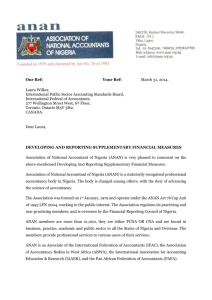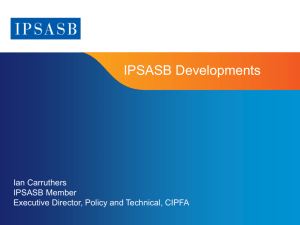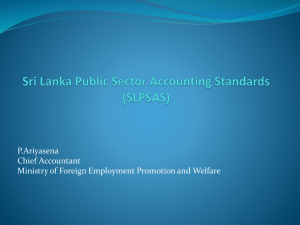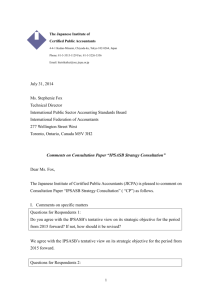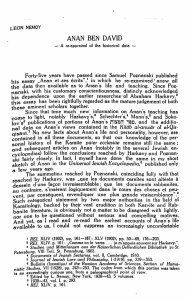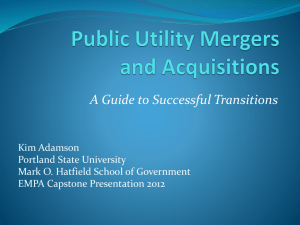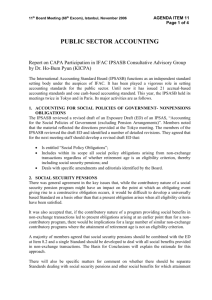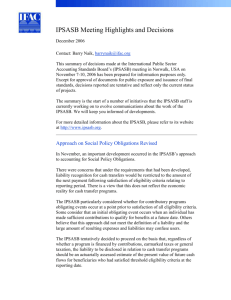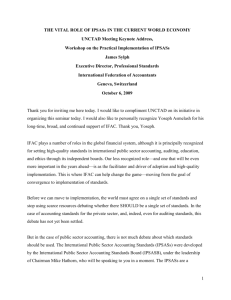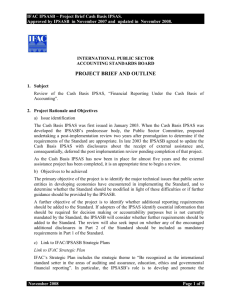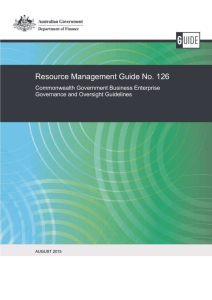Specific Matters for Comment 2 If you do not agree with the
advertisement
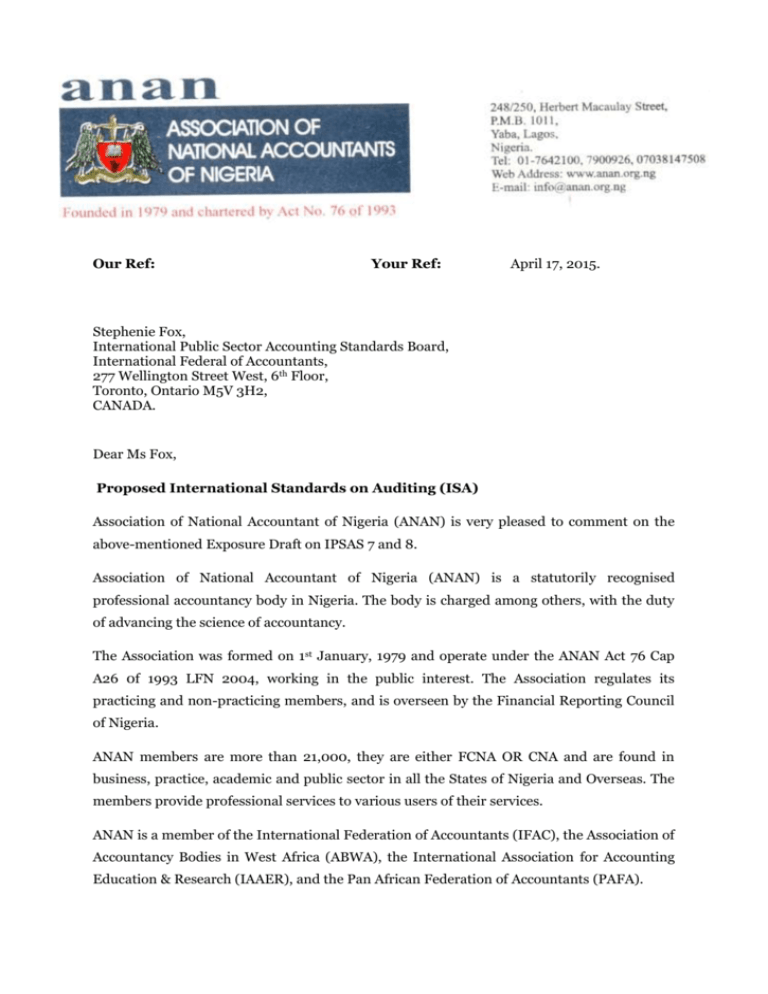
Our Ref: Your Ref: April 17, 2015. Stephenie Fox, International Public Sector Accounting Standards Board, International Federal of Accountants, 277 Wellington Street West, 6th Floor, Toronto, Ontario M5V 3H2, CANADA. Dear Ms Fox, Proposed International Standards on Auditing (ISA) Association of National Accountant of Nigeria (ANAN) is very pleased to comment on the above-mentioned Exposure Draft on IPSAS 7 and 8. Association of National Accountant of Nigeria (ANAN) is a statutorily recognised professional accountancy body in Nigeria. The body is charged among others, with the duty of advancing the science of accountancy. The Association was formed on 1st January, 1979 and operate under the ANAN Act 76 Cap A26 0f 1993 LFN 2004, working in the public interest. The Association regulates its practicing and non-practicing members, and is overseen by the Financial Reporting Council of Nigeria. ANAN members are more than 21,000, they are either FCNA OR CNA and are found in business, practice, academic and public sector in all the States of Nigeria and Overseas. The members provide professional services to various users of their services. ANAN is a member of the International Federation of Accountants (IFAC), the Association of Accountancy Bodies in West Africa (ABWA), the International Association for Accounting Education & Research (IAAER), and the Pan African Federation of Accountants (PAFA). ANAN RESPONSES TO ISA 800 (REVISED), SPECIAL CONSIDERATIONSAUDITS OF FINANCIAL STATEMENTS PREPARED IN ACCORDANCE WITH SPECIAL PURPOSE FRAMEWORKS AND ISA 805(REVISED),SPECIAL CONSIDERATIONS-AUDITS OF SINGLE FINANCIAL STATEMENTS AND SPECIFIC ELEMENTS, ACCOUNTS OR ITEMS OF FINANCIAL STATEMENT PROPSED CONFORMING AMENDMENT TO ANOTHER ISA ANAN Responses to the Questions in the Consultation Paper Specific Matters for Comment 1 1. Do you agree with the IPSASB’s PV? If so, do you prefer option 1a or option 1b? Please give the reasons for your view. We do not agree entirely with the IPSASB’s PV that approach 1 is most appropriate simply because it focuses on the characteristics of entities for which IPSASs are intended. Although this approach is in tandem with IASB’s approach to developing IFRSs, it should not be considered as the most appropriate for IPSASB’s development of IPSASs. This is because, there are so many complexities that surround Public Sector Entities which are absent in Private Sector Entities. Hence the need to vary the approach. Although we agree with the position of majority of the IPSASB members that option 1a is a high level and principles based approach that acknowledges the role of regulators and other relevant authorities in determining the entities that should apply IPSASs, we however believe that options 2(a) and (b) are also principles based. Additional clarifications of, or restrictions to standards that promote comparability of financial reports do not and cannot in themselves, make an approach non-principles-based or rules-based. Consistent with our responses in the preceding paragraphs, we have no preference for either option 1a or option 1b. Although option 1a will not define GBEs, it will describe the characteristics of public entities, for which the IPSASB is developing IPSASs, leaving regulators and other relevant authorities with decision on borderline cases. This approach may amount to solving the existing complex issues superficially and may likely give rise to divergent practices within and across jurisdictions thus adversely affecting the qualitative characteristic of comparability. Option 1b on the other hand will import a number of terms and explanatory guidance into IPSASB literature from GFS reporting guidelines. This approach tends to tilt towards rules-based approach as a threshold may be required to be used in defining the phrase “economically significant prices” (which is the 50% sales to production costs ratio) as is the clear case in GFS. This may necessitate relying heavily on GFS reporting guidelines in this matter despite their focus on economic rather than financial analysis. Specific Matters for Comment 2 1. If you do not agree with the IPSASB’s PV, Please indicate whether you support Option 2a or Option 2b in approach 2 or identify an alternative approach We support a combination of Option 2a and Option 2b. Under Option 2a, we support three aspects of the clarification to the definition of GBEs as provided in parag. 6.19 (p.18). The three aspects we support are (a), (b), and (d). Under Option 2b, we support only one aspect of the definition as provided in parag. 6.23 (p.19), that is (c). We observed that (a) and (d) in the two definitions (i. e. 2a and 2b) are the same. i. ii. iii. iv. v. It is our belief that GBEs are established by law with clearly spelt out objectives, functions and powers. The clarification of the definition of GBEs will be a step in the right direction as it will reduce the serious concerns that have been raised about the matter. It will also reduce divergent practices that will likely arise within and across jurisdictions thus promoting the qualitative characteristic of comparability. The fact that the GBEs are established by laws with clearly spelt out objectives makes them more accountable. We support a combination of Options 2a and 2b because they provided clear definitions of GBEs and also clarified the concept of full recovery cost. We support aspect (b) in Option 2a (6.19) because it recognizes both entities that can achieve recovery of full cost and those established with the objective of making profit. vi. vii. We do not support aspect (b) in Option 2b (6.23) as aresult of its restriction to the definition of GBEs as entities with profit oriented objective only. We do not support aspect (c) in Option 2a (6.19) because it is not very explicit on the meaning of "reliant on continued government funding". However, explicit clarification has been made in aspect (C) of Option 2b (6.23) which informed our selection. With this exposition, the GBEs in this category are almost similar in nature with entities in the private sector for which IFRS are applied. RECOMENDATIONS Under the revised definition of GBE in 6.19(a), the word “autonomy” may need to be added such that it reads as: “Has been assigned the financial and operational authority and autonomy in legislation ….” We believe that “authority” does not necessarily imply “autonomy” as it is possible for an entity to have authority without autonomy, since autonomy signifies “independence” while authority signifies “power”. It is possible for an entity to have powers that are subject to undue interference. Under 6.23(C), we recommend that two (2) phrases: “on a perpetual basis” and “unless such financial support are considered as addition to equity or debt” be added such that it reads: “Can prepare its financial statements on a going concern basis without being reliant on any continuing government funding or other forms of direct or indirect financial support from government on a perpetual basis (other than purchases of output at arm’s length). Such funding or financial support includes concessionary loans, government guarantees and grants for meeting service obligations; unless such financial support are considered as addition to equity or debt” The import of the phrase “on a perpetual basis” is to recognize the fact that government could support a GBE for a period of years to enable it stabilize financially and operationally. Such financial assistance does not continue perpetually. The import of the second phrase “unless such financial support are considered as addition to equity or debt” is to recognize the fact that GBEs could also benefit from government intervention funds (as may be akin to bailout) where the need arises to save strategic GBEs from collapse. If such supports are treated as addition to equity or debt, then the funds are not “free funds”, and therefore should be accommodated in the definition of GBE. Finally, we believe that relevant regulatory bodies in various jurisdictions can facilitate the classification of Public Sector Entities and their GBEs by compiling detailed list of entities that qualify for the application of IPSAS or IFRS. ASSOCIATION OF NATIONAL ACCOUNTANTS OF NIGERIA SUNDAY A. EKUNE, B.Sc. (Hons), M.Sc., MIoD, FCNA Registrar/Chief Executive
